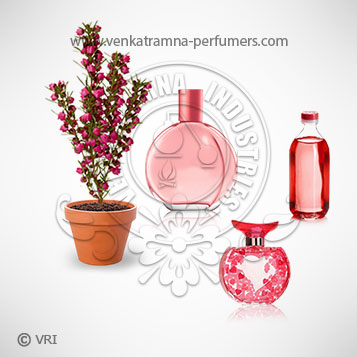
| Botanical Name | Boronia megastigma |
| Common Name | Brown Boronia |
| Country of Origin | Western Australia,Australia,Tasmania. |
| Solubility | Soluble in alcohol & oil, insoluble in water |
| Specific Gravity | 0.95000 - 1.02000 @ 25.00 °C |
| Optical Rotation | (-)1.5 –(-)4 @ 15°C |
| Refrective Index | 1.044 –1.054@ 20°C |
| PlantPart | Flowers |
| Bland With | Jasmine absolute, Neroli Essential Oil, Orange Essential Oil Sweet. |
| CAS No | 8053-33-6 |
| Flash Point | 143.00 °F |
| Extraction Method | Solvent extracted |
Boronia absolute oil is produced by the hexane extraction of leaves and flowers of the boronia tree. Boronia absolute has a fresh, spicy, fruit-like scent with a rich, floral undertone. The essential oil is derived through solvent extraction method which provides extract in form of a dark yellow viscous liquid having strong odor.
The star-like flowers of the boronias have long enchanted bush walkers in various parts of Australia from the east to the west coast. Add to this the delicate floral perfumes and cut flower qualities of species such as the brown boronia (B. megastigma) and you have a group of plants worthy of the attention of gardeners. It should be said, however, that boronias do not rank among the easiest of plants in the garden but it is fair to say that with the right attention to horticultural detail you can enjoy delightful displays of this outstanding group of Australian plants. If you treat boronias as short-lived perennial shrubs in your garden then you can enjoy them while they last without being overly disappointed if they do not become a more permanent part of the landscape. Boronias belong to the citrus family (Rutaceae) which is characterised by the presence of all kinds of interesting essential oils in the foliage and flowers. By holding a leaf up to a light source you will usually see translucent dots that represent the oil glands that are spread across each leaf. Crushing the foliage usually unleashes a scent which can vary from delightful to distressing, depending on which member of the family you are examining. Boronias are typical in this regard and foliage fragrances vary from the pleasing lemon-like Boronia citriodora to an odour not unlike that left by a tom cat marking its territory as in B. pinnata. A number of the boronias also have wonderfully perfumed flowers such as brown boronia and native rose
Color : Dark green viscous liquid with floral odor,
Aroma : Earthy scent or ground aroma
Ionon, eugenol, triacontane.
It is primarily used in perfumery and aromatics industry. It’s sweet, honey notes also makes it suitable for aromatherapy based applications. Soothing, inspiring and aiding in depression, the derived essential oil is also known for its aphrodisiac properties.